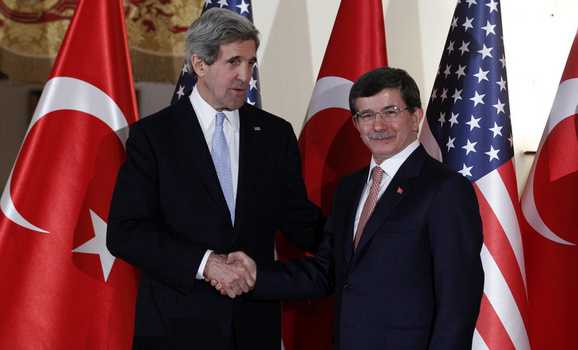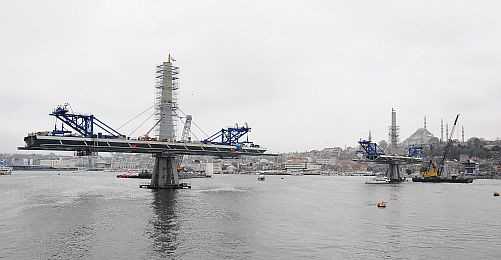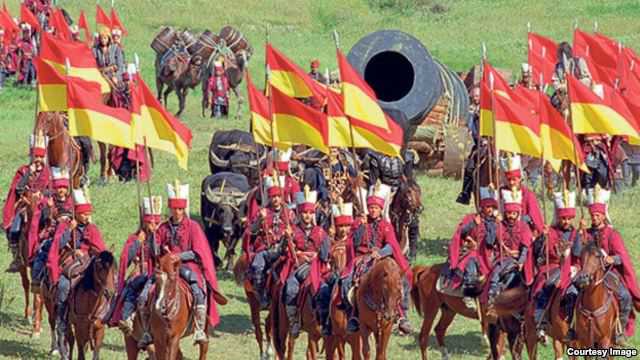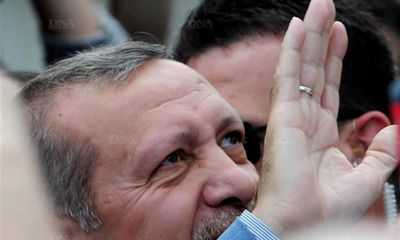In the eyes of secularists, the Europe-facing, Western-dressing, cocktail-toasting modern nation-state is being replaced by a religiously conservative one, headscarf by headscarf.
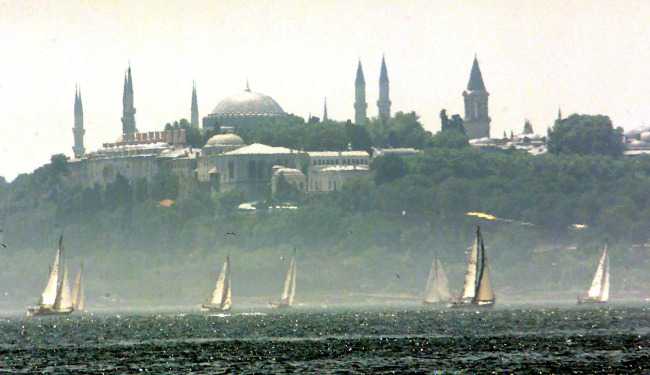
The cities might not seem similar today, but one thing Tripoli and Thessaloniki, Basra and Beirut, Sarajevo and Sana’a all once had in common is that just a little over a century ago they were all part of the Ottoman Empire. A second thing they all have in common is that until just a few years ago they harbored a certain disdain for Turkey … due in large part to the aforementioned empire.
Yet former rivals to the south, east, north and even west now attend Turkish business summits, watch Turkish shows, and purchase Turkish groceries. Interestingly and perhaps contrary to common sense, this recent shift seems to come not as a product of “time healing old wounds” but rather at a period when Turkey has embraced its Ottoman heritage to an unheard-of level.
The most popular television show,Magnificent Century, is essentially a soap opera set in the court of Suleiman the Magnificent, a bit like the Tudors but with even more imposing facial hair.
The foreign media loves to toss around the term “neo-Ottoman” when discussing the transformation of 21st century Turkey, particularly in reference to its increasingly assertive foreign policy and regional presence, much to Foreign Minister Ahmet Davutoglu’s chagrin.
The minister has time and again dismissed charges of neo-Ottomanism, pointing out that Turkey’s neighborly attentions are simply pragmatic foreign policy and do not harbor imperial ambitions. He scoffed at the idea yet again during a speech last month: “Why is it that when the whole of Europe is casting off its borders and unifying they don’t become the Neo-Romans or the New Holy Roman Empire, but when we call for the peoples who lived together just a century ago to come together once again, we are accused of being Neo-Ottomans?”
But beyond foreign policy there lies a much more significant domestic transformation, one that is also driven by history. In that same speech, the foreign minister spoke of the need for a “great restoration” where “we need to embrace fully the ancient values we have lost.” Praising the historic bonds that connected the peoples of Turkey over the “new identities that were thrust upon us in the modern era,” Davutoglu maintained that the road to Turkey’s progress lies in its past – an assertion that has terrified the government’s detractors enough for them to make it a losing political platform each new election.
Turkey’s new direction has become the topic of fervent internal debate, with tension growing between the secular establishment — in charge for the republic’s first 80 years — and the rising conservative bourgeoisie represented by Prime Minister Recep Tayyip Erdogan and his Justice and Development Party (AKP), which has ruled the country for over a decade. The term “neo-Ottoman” might not pop up as often in the Turkish press as it does in foreign media, but the prime minister and his party are often accused by opponents of a certain Otto-philia for their Islamic sentiments and sympathetic view towards the old empire — a disgraceful entity that represents every problem the modern republic was meant to solve, according to many secularists. After all, the past decade has had Erdogan and the AKP preside over (and according to critics, openly foster) an Ottoman cultural revival.
The most popular television show, Magnificent Century, is essentially a soap opera set in the court of Suleiman the Magnificent, a bit like the Tudors but with even more imposing facial hair. The highest grossing film, Conquest 1453, is about Mehmed the Conqueror’s conquest of Istanbul in 1453 and features decadent Byzantines and an ambitious, albeit magnanimous, Sultan Mehmed. Just last month mock-ups of a potential redesign of Turkish Airlines’ uniforms were leaked, with one notably Ottoman redesign featuring fezzes and thick, conservative outfits for the female cabin crew, to replace their proudly secular pencil skirts. All these events, plus countless other Ottoman-inspired fashion shows, art exhibits, and university seminars have lead to the reestablishment of a brand forgotten nearly a century ago.
And while the Ottoman brand might be on the rise, it is not without its critics.Conquest 1453 was panned by the liberal democratic intelligentsia for its two-dimensional portrayal of Mehmed’s enemies and the idea that peace comes only after subduing all opposition. Meanwhile, the secular establishment erupted in a furor over the Ottoman-esque airline uniforms, just the latest in a series of betrayals of the secular republic. In their eyes, the Europe-facing, Western-dressing, cocktail-toasting modern nation-state established in 1923 by founding father Mustafa Kemal Ataturk is being replaced by a religiously conservative one, headscarf by headscarf. Many have even taken to calling the prime minister Sultan Erdogan.
The prime minister, rarely holding back on criticisms himself, has in turn lambasted Magnificent Century from the other side of aisle: his issue being not that it is too Ottoman, but not magnificently Ottoman enough – too much soap opera, not enough might and traditional values. Such a sentiment, along with many others like it, are consistent with his opponents’ narrative of Erdogan as an archconservative who derives his motivation not from the West like Ataturk but from the East like, well, a religious Muslim would.
Turkey’s current transformation in culture and foreign policy may very well be derived from the east, but further east than some may think. The drive for change comes not from the 16th century Middle East or even 7th century Arabia, but rather 19th century Japan.
Japan’s Meiji Restoration of 1868 and Turkey’s Kemalist Reforms that followed the establishment of the republic in 1923 are both models of modernization adopted by lagging countries in the periphery of the West. Both ushered in new eras for their respective countries and both involved great risks, often implementing drastic measures and facing hostile opposition — the former even featured in a Hollywood blockbuster where a distinctly non-Japanese Tom Cruise stood up for traditional Japan.
But the fundamental divergence between the two paradigms was in their disagreement over the role of culture. Adopting the slogan “Western technique, Japanese spirit,” the Meiji Restoration involved taking the technological, scientific, industrial and military advancements of the West but retaining Japanese values. Japanese culture needed not be sacrificed in adopting modern economic and military techniques and would in fact be the glue that kept a revolutionary society together.
The Ottoman Empire had already tried, and failed at, something similar in 1839 with the Tanzimat Reorganization, so by the time Ataturk’s Kemalist Reforms rolled around 50 years after the Meiji Restoration, modernity and tradition seemed irreconcilable: modernization could not occur without Westernization. Almost everything was brought in line with the West; clothing was Europeanized, the alphabet was Latinized, numerals were – rather ironically – Arabized, and women could now not only display their hair but also vote and pursue professional careers, just to name a few. Turkey was to become a European country in mind, body and soul, preferably even more European than many countries in Europe at the time, and for the first eight decades of the republic even suggesting otherwise was unthinkable — which is why many in the secular establishment see the AKP’s efforts to the contrary scandalous at best and traitorous at worst.
His vision was never one of reviving the “sick man of Europe,” but rather synthesizing the best of the West and the best of the East in order to strengthen his hand.
Yet despite what critics, opponents and even outside observers might suggest, Erdoğan doesn’t seek a return to pre-revolutionary Turkey. His actions aren’t those of an overzealous Ottoman romantic but rather of a Meiji restorer, re-appropriating the republican revolution by redefining its spirit and essence to one that blends Western innovation with local culture, tradition and historic bonds — “Western technique, Ottoman spirit” if you will.
He has never really been coy about this aspiration either, openly declaring “we cannot deny our Ottoman past” in an interview with TIME Magazine in September 2011, then adding “it’s a very natural right for us to use what was beautiful about the Ottoman Empire today. We need to upgrade ourselves in every sense: socially, economically, politically.”
So it’s no surprise that Foreign Minister Davutoglu’s speech last Friday was held at a conference titled “The Great Restoration: Our New Political Approach from the Ancient to the age of Globalization.” There the minister would go on to proclaim, “Humanity is in need of a great restoration; our region is in need of a great restoration, and right in the center of all this great restoration, our very nation is striving for its own great restoration within itself.” One does not repeat with such fervor the “need to restore greatly” unless they are making a point about the distinction between restoration and reform: the former is about bringing back something essential that was lost, the latter is about changing that which exists.
The Erdogan Restoration vs. the Kemalist Reforms is a lot more nuanced than simply “neo-Ottoman.” As the prime minister speaks of EU membership one day while boosting trade with the Middle East the next, he is not being hypocritical or deceitful . His vision was never one of reviving the “sick man of Europe,” but rather synthesizing the best of the West and the best of the East in order to strengthen his hand.
Nor is this recent Ottoman revival necessarily about returning to an era of greater morality. If your country has spent the past nine decades claiming to be a copy of the West, then the West has no reason to see you as anything more than an inferior copy of itself. This might not be an issue for those satisfied with geopolitical irrelevance, but the more ambitious will want to figure out something new to sell, something better than a simple knockoff. And so Erdogan and the AKP are busy rebranding Turkey from its original rebranding in 1923. It is difficult to see how such a path will fare; after all, Japan might have had countless ups and downs in the century and a half since its own restoration, but at least no person can claim they haven’t been making headlines ever since.

